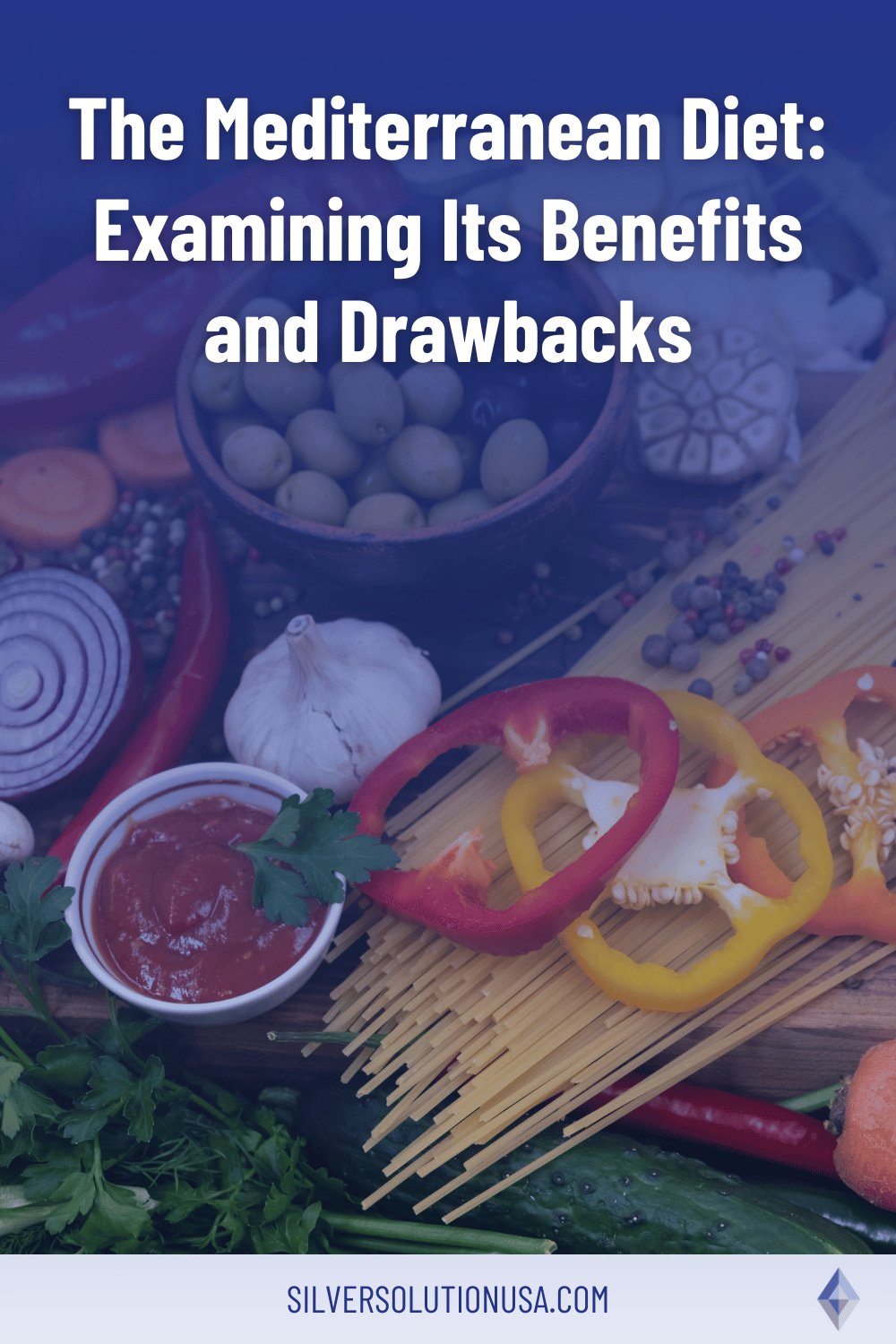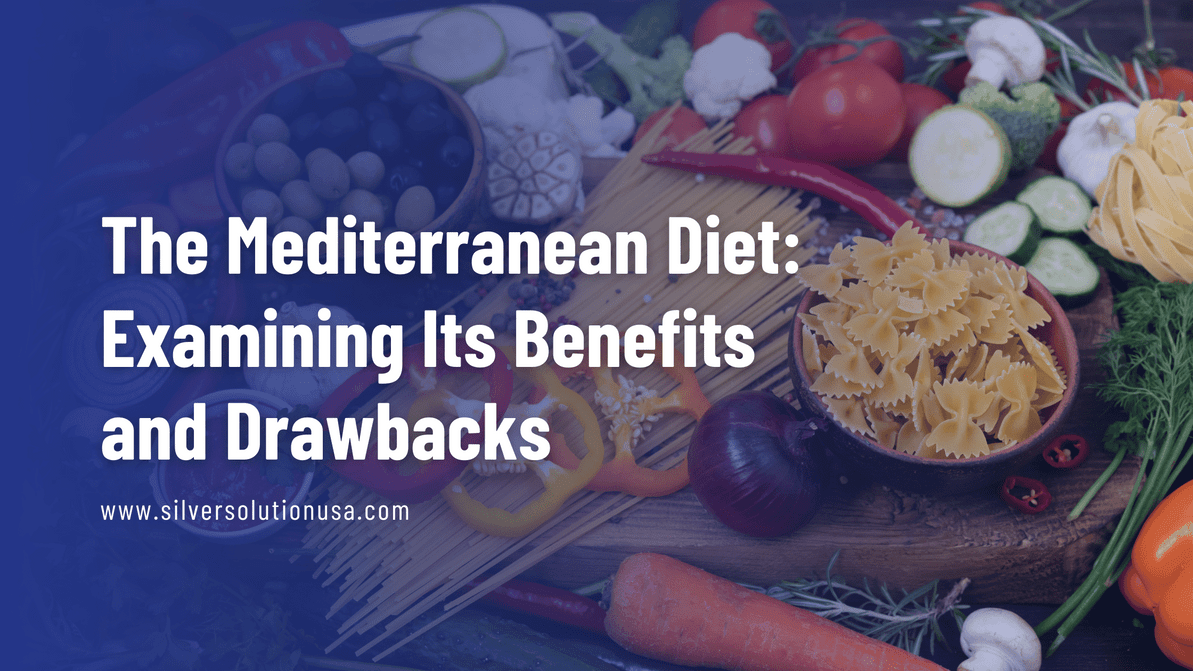The Mediterranean Diet: Examining Its Benefits and Drawbacks
When it comes to diets, there is something for everyone. The one major drawback? Few of them have medical studies backing them up. One exception to this rule is the Mediterranean diet. Rich in fruits, vegetables, healthy fats, and whole grains, this diet could be the secret to a long and healthy life.
Despite all this, there are Mediterranean diet pros and cons you need to know. It’s healthy and nutritious; studies show it may even prevent cancer. Despite all this, some find it challenging because of the lack of guidelines. Plus, the costs can add up rather quickly.
To choose or not to choose the Mediterranean diet? We’ll give you all the information you need to make the best choice for your body and lifestyle.

What is the Mediterranean diet?
The Mediterranean diet is based on the traditional food in countries bordering the Mediterranean Sea, such as Italy, Greece, Spain, and France. There are very few rules around it, and no foods are forbidden.
What to eat
If you want to eat a Mediterranean diet, include foods like:
- Fish and seafood
- Fruits
- Vegetables
- Nuts
- Seeds
- Legumes
- Beans
- Potatoes
- Whole grains
- Extra virgin olive oil
You’re encouraged to use herbs and spices when you cook. The diet also recommends moderate consumption of:
- Poultry
- Eggs
- Yogurt
- Red wine
- Cheese.
In short, if a food is in the first group, eat it daily if you wish. There are no rules telling you how much to have. The second group is also great, but don’t make it a daily staple.

What to avoid
Unlike diets like Paleo or keto, the Mediterranean diet doesn’t forbid any foods. That being said, there are some you should avoid. If you do eat some of these, make it a rare occasion, like a celebration or other moments when you want to indulge a little. These foods include:
- Red meat
- Sugar
- Beer and other types of alcohol (except red wine)
- Highly-processed foods
- Refined grains
- Foods containing trans fats
Mediterranean diet pros and cons
What do the Blue Zones—those areas around the world where people seem to live longer and be healthier—all have in common? They eat foods commonly found in a Mediterranean diet. This promotes heart health, balances blood sugar levels, and may even prevent cancer.
Plus, researchers have taken an in-depth look at it, unlike many other diets that lack clinical studies. It’s official: the Mediterranean diet has a lot of health benefits!

Benefits of the Mediterranean diet
1. It is high in nutrients
The Mediterranean diet offers a wide variety of foods. It encourages the consumption of whole foods, fruits, and vegetables, all rich in vitamins and minerals. Fish is another one of its staples, meaning you can get plenty of omega-3 fatty acids effortlessly.
A key aspect is the variety. Unlike keto or Paleo, which take out entire food groups, the Mediterranean diet allows you to eat a little bit of everything. Yes, even the occasional pizza, though you might need to be careful with those toppings.
2. Promotes heart health
Did you know that the Mediterranean diet is recommended by the American Heart Association? That’s because there’s evidence it can prevent strokes and cardiovascular disease.
Some say a simple low-fat diet can achieve the same results. It turns out that’s not exactly true. A randomized controlled trial conducted in 2021 compared the effects of the Mediterranean and low-fat diets.
It showed the former was more effective at slowing down artery plaque build-up. This build-up is one of the leading causes of coronary disease; without it, your chances of developing it are drastically reduced.
3. Helps stabilize blood sugar levels and may prevent diabetes
Studies show a Mediterranean diet can help:
- Stabilize blood sugar levels, which can help prevent and even manage type 2 diabetes.
- Decrease insulin resistance, which can again prevent diabetes. It may also help manage polycystic ovarian syndrome (PCOS) when its primary driver is insulin resistance.
- Improve levels of hemoglobin A1C, which is used to measure long-term glucose levels. A systematic review of 56 trials, including almost 5,000 people, showed those following a Mediterranean diet had A1C levels 0.32% lower than those on other diets.

4. Promotes mental health and protects the brain function
Like it or not, cognitive decline is part of aging. You can’t stop it entirely, but you can slow it down significantly. One way to do it may be to eat a Mediterranean diet.
A systematic review of over 40,000 participants linked this diet to improved cognitive function, memory, and processing speed in healthy older adults.
Another study showed the Mediterranean diet could lead to a reduced risk of clinical depression, or at least fewer, less intense symptoms. So if you’ve ever wondered how to eat for brain health, this diet could be the answer.
5. It reduces inflammation and may prevent cancer
Inflammation is the root cause of many diseases, including diabetes and even cancer. To measure inflammation levels in your body, doctors usually test for markers such as interleukin 6 and C-reactive protein. The higher your levels of one or both markers are, the more chances you have of developing a disease.
But high levels don’t mean you’re instantly doomed. A few dietary changes can go a long way. A study published in 2015 links the Mediterranean diet to a decrease in inflammatory markers.
6. May help you lose weight
Many report losing weight when going on the Mediterranean diet, and if you look at its food list, you can understand why. You’ll be avoiding junk food and added sugars most if not all of the time and replacing them with whole foods.
Most people who eat a standard diet will lose weight effortlessly when switching to a Mediterranean diet. You’ll need to pay attention to it long-term, though. The diet doesn’t restrict portions, so you could still overeat if you’re not careful.

Drawbacks and considerations
Like anything diet-related, there are Mediterranean diet pros and cons. While the health benefits are incontestable, it has a few drawbacks that could make it a challenging diet for some.
1. Can be expensive
If you live near the Mediterranean, eating this diet will be effortless and cheap. For the rest of the world, there may be some challenges. Many of the recommended foods might not be available in all seasons, and those like fish, nuts, and seeds could be very expensive.
Some also prefer to choose organic produce, even though that’s not a direct requirement. For them, the prices will often go higher quickly, and they might find their options are not as varied.
To save costs, you can choose local produce and go with what the season offers. There’s no need to eat oranges in the middle of summer or watermelon in winter.
2. It allows alcohol
One of the main critiques of the Mediterranean diet is the inclusion of red wine. Of course, just because it is on the list of approved foods doesn’t mean you have to drink it. But some may take it as an “okay” to over-drink, which could reduce some of the other benefits of the diet.
The bottom line? You can have some red wine. But as with everything food and especially alcohol-related, moderation is king.
3. There’s no guidance
Many people who switch from a standard diet to something more balanced need additional guidance. That can include portion control tips and even caloric guidelines. The Mediterranean diet offers none of that.
That makes it a great diet for people who want to be healthy without controlling every bite they take. It can even be a good choice for those with a history of eating disorders who may find stricter guidelines triggering.
But for some, the lack of rules could be challenging and may allow them to continue overeating.

Key takeaways
The Mediterranean diet is one of the healthiest diets out there and definitely one of the most researched ones. It can help balance blood sugar levels, making it a great choice if you want to manage or prevent type 2 diabetes. It also promotes heart and brain health, reduces inflammation, and could help you lose weight.
On the other side, it can be a costly diet, especially if you don’t have enough healthy food options locally. The lack of guidelines and the inclusion of alcohol makes some feel like it’s not the best for everyone. But with moderation in mind, these cons can be overtaken.
Did you find this article useful? Help us spread the knowledge and share it with a friend!

Health/Medical Disclaimer
This blog post does not provide health or medical advice. This blog post is for informational and educational purposes only and is not a substitute for professional health or medical advice. Before taking any actions based upon such information, we encourage you to consult with the appropriate medical and healthcare professionals. We do not provide any kind of health or medical advice. The use or reliance of any information contained on this blog is solely at your own risk.
Sources
https://www.heart.org/en/healthy-living/healthy-eating/eat-smart/nutrition-basics/mediterranean-diet
https://www.ncbi.nlm.nih.gov/pmc/articles/PMC4411995/
https://www.ncbi.nlm.nih.gov/pmc/articles/PMC7468821/
https://link.springer.com/article/10.1007/s10654-017-0352-x
https://www.ncbi.nlm.nih.gov/pmc/articles/PMC5502874/
https://www.nature.com/articles/s41380-018-0237-8
https://www.nature.com/articles/s41380-018-0237-8
Recent Posts
-
Are sunscreen ingredients harmful?
Sunny days can bring a lot of fun. Going out for a swim, spending time in nature, or relaxing on the …18th Mar 2024 -
The Veggie Debate: Does Cooking Vegetables Destroy Nutrients and the Best Ways to Cook Them
Vegetables are one of the healthiest foods you can choose. Some people downright hate them, while so …4th Mar 2024 -
Best Foods for COVID Recovery and Prevention
A few years ago, a new virus took the world by surprise. COVID-19 may look like the flu on the surfa …19th Feb 2024




